- Home
- Mark Hodder
Sexton Blake and the Great War Page 9
Sexton Blake and the Great War Read online
Page 9
“What could be easier?”
The Kaiser gnawed his upper lip doubtfully.
“Just because it all sounds too easy do I doubt its success,” he answered. “I know this Sexton Blake, and twice has he thwarted even me. It is not like him to give up a case so easily, especially when such great issues are at stake.”
Herr Leiberbaum shrugged his shoulders a trifle impatiently. He had risked a lot to help the ruler of his native land, and this hesitation annoyed him.
“Very well, sire,” he said; “we will think of another plan!”
“No, no!” the Kaiser cried hastily. “Order the carriage round at once!”
Leiberbaum touched a bell, and less than a minute later a closed carriage drove round to the front door.
“This man could not possibly have been bribed?” the Kaiser whispered anxiously, peering out at the solid face of the coachman.
“He, too, is of our country, sire,” Leiberbaum answered. “There is no time to lose. I have already told the man to drive to Bellborough, ten miles from here. That place will not be watched. He will time his arrival so that you only just have time to catch your train. Here is your ticket.”
Just for a moment more the Kaiser hesitated, then he stepped into the carriage. He held out his hand to Herr Leiberbaum.
“I shall not forget,” he said gratefully.
“Nor I, sire,” Leiberbaum answered, bending ponderously over the outstretched hand.
The carriage drove away, and the Kaiser, leaning back in a corner, felt that his troubles were over at last. Once he was clear of the town he would make for someplace right up in the north, after sending instructions to the commander of the Hohenzollern to proceed there. Possibly, Blake was keeping an eye on the Royal yacht, but the Kaiser knew that he dared not do anything once he was on board.
The carriage proceeded rapidly, the broad roads of the residential part were left behind, and the busier thoroughfares entered. The Kaiser leant back further in his corner, fearing that he might be recognised, forgetting that the loss of his moustache was about the finest disguise that he could possibly have had. And with each yard that he covered, he began to feel more and more relieved, and to believe that Sexton Blake had at last been baffled.
“Illness o’ the German Hemperor!” a newsboy yelled, and the Kaiser, glancing out of the carriage, saw those words on the poster. He bit his lip savagely, realising that his absence from public life had already been noticed, and that some excuse had had to be made to account for it.
A little further on another boy was displaying a placard, and the words on it brought a growl of anger from the Kaiser.
“Where is the German Emperor?” the bill ran.
The Kaiser pulled the check-cord, and the coachman pulled up. Out of the carriage the Emperor leant, forgetting all about secrecy now, and bought a paper. Little did the grimy-faced urchin who sold it imagine that the scare-line on the placard that he held in front of him referred to this angry-looking man to whom he sold the paper, and who gave him a piece of silver, and drove on without waiting for the change. It was only when the carriage had gone a couple of hundred yards that he discovered that the silver coin was not a shilling, but a piece of foreign money.
“No wonder ‘e was in sich a ‘urry!” he growled. “S’pose I’ll be able ter pass it somewhere!”
Leaning back in the carriage, the Kaiser unfolded the paper with fingers that trembled rather badly, and he had no difficulty in finding the part of the contents that referred to himself. The headings were heavily leaded, and ran as follows:
“WHERE IS THE KAISER?
Is He Watching The Manoeuvres?
“Our Berlin correspondent telegraphs us that for more than a week the Kaiser has been invisible, and that several state functions at which he was to have been present have been postponed. The reason given for this is illness, but it is hard to believe that that is true, for not one of the court physicians have been to the palace. Naturally, there arises the question as to where the Kaiser really is. To answer it is impossible, but, perhaps, it is easy to guess.
“WHERE IS THE HOHENZOLLERN?
“The Imperial yacht is somewhere in the North Sea, and we need scarcely remind our readers that that is where the great secret manoeuvres are taking place. Already the yacht has been close to the war vessels, and it is reported that the Kaiser has been seen on board. This seems to be probable, yet, if it is the case, it is surely remarkable that his Majesty paid no visit to the admiral in charge, despite the fact that a salute of guns was fired as soon as the Royal yacht approached.
“Surely, considering that even British vessels are forbidden to follow the manoeuvres with sightseers on board, something should be done to check this German spying. True, the spying is being done by no less a man than the Kaiser, but that only makes it more significant.
“Is it not quite time that this kind of thing was put a stop to?”
The Kaiser crumpled the paper up and threw it away.
“The fools!” he muttered.
The carriage was passing along a busy thoroughfare now, and the traffic was at times congested.
Suddenly, a heavy cart swung out of a side turning, tried to cut in front of the Kaiser’s brougham, swung round to avoid a collision, but was too late. The heavy wheel of the cart caught the rear wheel of the brougham and fairly ripped it off.
In an instant all was excitement. The shock of the impact had thrown the brougham horse, which was now doing its best to kick the carriage to pieces, and the coachman hastily jerked the door open.
“Afraid you were hurt, sir,” he whispered, as he helped the Kaiser out.
Already a crowd had sprung up, apparently from nowhere, and a policeman was forcing his way through. The Kaiser went white, fearing recognition.
“Now then, what’s all this?” the constable demanded importantly.
The Kaiser looked round quickly, his one idea being to get away from the crowd.
“Cab, sir?” a man shouted, drawing his cab up beside the crowd.
Without hesitation, the Kaiser pushed his way through the crowd.
“Bellborough station!” he ordered, and stepped into the cab.
With a cry he started back, but a hand gripped his wrist. The cab was already occupied—by Sexton Blake!
“What does this mean?” the Kaiser demanded in a shaking voice.
“Merely that I am not beaten so easily as you imagine, sire,” the detective answered blandly.
“Then you—”
“Precisely,” Sexton Blake explained. “The accident was arranged by me. Of course, I could have followed you to Bellborough, but I was not anxious to make a scene there—for your sake—and it is so much easier to explain in this cab.”
The Kaiser moved nearer to the window.
“I shall order the man to stop!” he said fiercely.
“I should not, if I were you, sire,” Sexton Blake protested. “You see, the man happens to be Mr. Spearing, and I doubt whether he would take orders from you.”
The Kaiser leant back in his seat, the look of a man who knows that he is beaten in his eyes.
“Where are we going!?” he asked at last.
“We are carrying out my original intention, sire,” Sexton Blake answered. “We are going to London.”
“I refuse!” the Kaiser snapped.
Sexton Blake shook his head playfully, and called to Spearing to drive faster.
“You really should not joke, sire!” he protested.
THE ELEVENTH CHAPTER
In London—By Way of the Embankment—The Call for Help—The Kaiser Captured.
SEXTON BLAKE HELPED the Kaiser to alight from a cab, and dismissed it.
“Where are we?” the latter asked sharply, looking round at the practically deserted streets.
“Why, by St. Paul’s Station, close to the Embankment, sire,” the detective answered readily.
On the other side of the road a cab pulled up, and four men clambered out. They walked b
riskly across to the station and entered the booking-office. If anyone had followed them, however, he would have seen that they did not take tickets, but stood close to the door, one of them peering out, as if waiting for someone.
“But why here?” The Kaiser protested. “Were you not taking me to this Prime Minister of yours?”
“Precisely,” Sexton Blake agreed. “It is quite time that you made the terms that will purchase your liberty, and I mean that you shall do so to-night.”
“Bah, you mean great things!” the Kaiser sneered, but there was an uneasy look in his eyes. “Others know that I am here, and I tell you that if I do not go free soon it will mean war.”
Sexton Blake bowed coolly, and lit a cigar.
“I am aware of that,” he admitted—“quite aware that men of your own country know that you are here. You think it possible that I can have passed all the years that I have at detective work without knowing that there is quite a small army of Germans in England? Ay, I know that, and that practically every town, every defence in Great Britain is as well known to your officers as to ours—more shame to us! Your spies have worked well for years, unhampered by our authorities, though the truth has been pointed out to them!”
“They have laughed—saying they were too strong for us,” the Kaiser sneered.
“And at present we are,” Sexton Blake said quietly; “for your plans are not mature, especially now that you have had that little upset in the Shetlands.”
The Kaiser glared as he thought of the work of years being done by a few dynamite cartridges.
“Let us go to this minister of yours!” he snapped. “Perhaps he will see reason.”
Sexton Blake nodded, and slipped his arm through the Kaiser’s. The latter tried to free himself, but found it impossible.
“Am I to be treated as a criminal?” he demanded haughtily.
“Why, no, sire,” Sexton Blake answered, “but as a precious possession that must on no account be lost. Besides, it has been raining, and the pavements are slippery. What more natural than I should try and prevent you falling?”
The two crossed the road, and entered the Embankment. It was ten o’clock, an hour at which there is very little traffic about, for it is too early for the theatre traffic to be swarming down onto the Embankment. Here and there a couple of ragged men lounged on the seats, but a penetrating drizzle was falling, and that had driven most of the outcasts to the shelter of arches and doorways, where they would crouch until the police should turn them out.
On the river the lights of an occasional barge or tug glimmered, but even they were made dim by the rain.
If Sexton Blake had looked behind him he would have seen that the four men who had entered St. Paul’s Station were following. True, if he had looked back, he still would have thought nothing of it, for what was there remarkable in four men walking westwards along the Embankment at that hour of the night?
Past the Temple Sexton Blake and the Kaiser walked, stepping out briskly, and it was then that the four men following separated, and one hurried on ahead of the rest, and passed the detective and his companion. He was a ragged-looking fellow, and he walked with the shuffle peculiar to the outcast, vagrant class. His companions had quickened their pace, too, but slackened it again when within twenty yards of the detective.
Something about the furtive manner of the man who had shuffled past attracted Sexton Blake’s attention, and he followed him with his eyes. He saw him hesitate, glance round once or twice, then turn towards the steps leading from Cleopatra’s Needle to the river.
A queer feeling gripped at the detective’s heart. No man in London knew better than he what a favourite place for suicides this was, and he quickened his footsteps.
“Help!” The cry rang out shrilly from the direction of the steps, breaking off as if choked back by the water.
Jerking the Kaiser with him, Sexton Blake started forward at a run. He guessed that the outcast had flung himself in, meaning to take his life, but had learnt to fear death as soon as he had struck the water. There are many would-be suicides like that, men who do not realise really what they are doing until the bony hand of Death is really at their throats.
In the ordinary way, Sexton Blake would not have hesitated to dive in after the man, but things were different now. He was linked to the Kaiser, and not for so much as a second dared to release him.
Straight to the steps he ran, still dragging the Kaiser with him, and stood peering down at the swiftly-running river. He could see no trace of the vagrant, and decided that the tide must have already—
Someone leapt from the shadow of the wall, and Sexton Blake, seeing him coming, tried to dodge aside. In this manner he half avoided the blow aimed at him with a heavy cudgel, but even then it struck him down the side of the head and glanced off on to his shoulder, causing him to stagger back.
Before he could recover himself a pair of powerful hands had gripped him, and he was being forced down the steps towards the water. The danger of his position roused him, and in the darkness he stared into his assailant’s face.
It was a face to remember, too. Livid white, adorned—if the word may be used—by a straggling, red beard. But the one thing that the detective noted more than all else was a scar that had severed the upper lip at some time or another, healing so that it was all puckered and drawn up.
All this Sexton Blake saw, but the blow on the side of the head had temporarily weakened him, and he struggled but feebly as he felt himself being forced down the steps.
Then he was heaved backwards, the evil face with the red beard was no longer near to his own, and he struck the cold waters of the Thames and sank beneath the surface.
The shock of the cold water revived him, taking away the dazing effects of the blow that he had received, and he struck out strongly to get his head above the surface. Then he shook the water from his eyes, and found that the tide was fast carrying him past the steps, with a strength that there would be no fighting against.
He cursed himself for a fool, telling himself that he ought to have known that another attempt would be made to rescue the Kaiser. He looked to where he had left his distinguished prisoner, and a gasp of amazement broke from him.
By the light of a lamp on the Embankment Sexton Blake saw four men struggling, and the man in the midst of them was the Kaiser. Then the tide carried him on, and he could see no more.
Sexton Blake’s brain fairly swam, partly with the blow that he had received, partly with what he had just seen. Why was the struggle going on if these men were rescuing the Kaiser? For what other reason could they have thrown the detective into the Thames?
A sharp splash caused Sexton Blake to turn, and he caught a glimpse of a man struggling in the river. In a glance he saw that he could not swim, and, without hesitation, he turned and swam back towards him. The tide prevented him making much progress, but it also bought the struggling man towards him.
Just as the man was about to sink, Sexton Blake contrived to grip him.
“Keep still,” he panted, “and I will save you!”
The man made no answer, he had fainted, and Sexton Blake, swimming on his back, the man’s head supported on his chest, struck out down stream, working close to the wall so that he might strike the next lot of steps.
The tide was running with a vengeance, and it was less than five minutes when he was able to scramble on to the steps and drag the unconscious man after him. Up the steps he went with him, and laid him down, thankful to see that there was no one about, for he was not anxious to have to answer a lot of questions just then.
He looked keenly along to where he had seen the struggle going on, but the place was deserted.
A cab came crawling by, and the detective hailed it. The man at once drew up to the kerb, but made a move to go away again as soon as he caught sight of the condition of the detective’s companion.
“No inquests fer me,” he growled.
Sexton Blake seized the reins, and the horse stopped.
/> “Here, leggo!” the cabby cried angrily, flourishing his whip.
“A sovereign to take us to Baker Street,” the detective said shortly.
“He ain’t corpsed?” the cabby asked, nodding at the insensible man.
“No.”
“Then I’ll do it for two quid,” the cabby said. “It’s worth that fer messin’ the cushions up.”
Without comment Sexton Blake carried the man into the cab, and it drove away. Then he turned his attention to the man, starting as he recognised in him Herr Leiberbaum’s coachman. He tried to bring him to, and had just succeeded when Baker Street was reached. Tinker opened the door, and his face was blank with amazement when he saw that it was not the Kaiser who was with his master.
“What’s wrong, sir?” he asked quickly.
“Get brandy at once, my lad,” Sexton Blake answered shortly, “then ‘phone Spearing to come here; I think there will be work for him.”
A stiff dose of brandy quickly brought the young German to his senses, and he staggered from the couch on which the detective had laid him.
“Where is he?” he cried, in a shaking voice.
“The Kaiser?” Sexton Blake queried.
“Yes, yes,” the German agreed, a terrible look of fright in his eyes. “What have they done with him?”
Sexton Blake gripped the man by the shoulders and forced him back onto the couch.
“That is just what I want you to tell me,” he said sternly.
For a moment the man lay staring up at the detective, then he dragged himself to a sitting position, and gripped him by the arm.
“You are Sexton Blake,” he asked hoarsely—“the man who captured the Kaiser?”
“Yes.”
The young German looked quickly round the room, as if to make sure that no one else was there.
“Then you must save him!” he cried. “Within an hour he may be dead!”
Cool man though Sexton Blake was he staggered back, and his face went pale. The man on the couch was not bluffing, for his eyes were wild with fear. He spoke the truth.

 The Secret of Abdu El Yezdi
The Secret of Abdu El Yezdi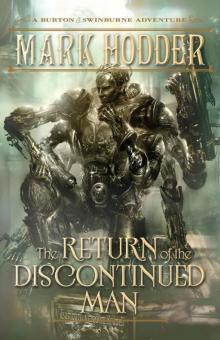 The Return of the Discontinued Man
The Return of the Discontinued Man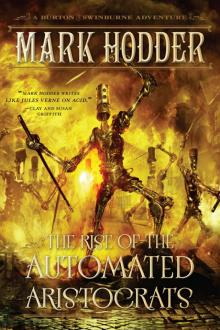 The Rise of the Automated Aristocrats
The Rise of the Automated Aristocrats Macallister Fogg 2: Great Great Great (And So Forth) Uncle Dragoslav
Macallister Fogg 2: Great Great Great (And So Forth) Uncle Dragoslav Sexton Blake and the Great War
Sexton Blake and the Great War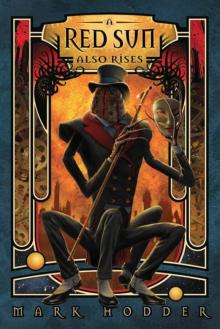 A Red Sun Also Rises
A Red Sun Also Rises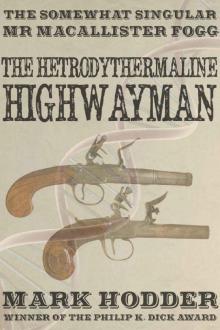 Macallister Fogg 3: The Hetrodythermaline Highwayman
Macallister Fogg 3: The Hetrodythermaline Highwayman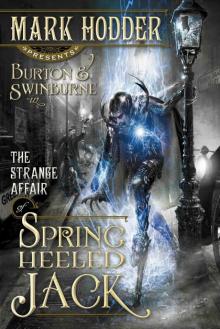 The Strange Affair of Spring Heeled Jack
The Strange Affair of Spring Heeled Jack Macallister Fogg 1: The Master Mummer's Mummy (The Adventures of Macallister Fogg)
Macallister Fogg 1: The Master Mummer's Mummy (The Adventures of Macallister Fogg) Expedition to the Mountains of the Moon bas-3
Expedition to the Mountains of the Moon bas-3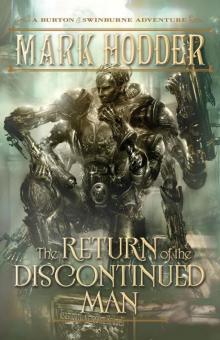 The Return of the Discontinued Man (A Burton & Swinburne Adventure)
The Return of the Discontinued Man (A Burton & Swinburne Adventure)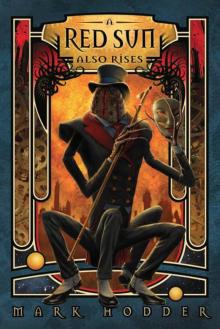 Red Sun Also Rises, A
Red Sun Also Rises, A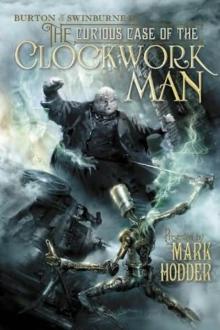 The curious case of the Clockwork Man bas-2
The curious case of the Clockwork Man bas-2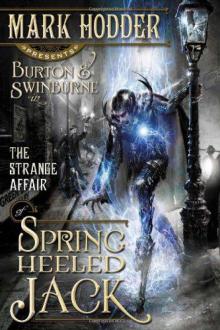 The strange affair of Spring-heeled Jack bas-1
The strange affair of Spring-heeled Jack bas-1